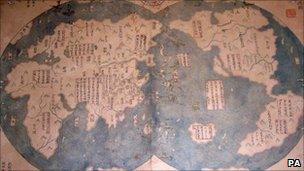Chinese search for Ming shipwreck off Kenyan coast
- Published

Zheng He is China's most famous explorer
Chinese archaeologists are due to begin searching for the remains of a Chinese ship believed to have sunk off the Kenyan coast 600 years ago.
The shipwreck could provide evidence of the first contact between China and east Africa.
The three-year project will search in northern Kenyan coastal waters off Lamu island and Malindi.
The joint initiative by China and Kenya comes after porcelain from China's Ming dynasty was found in the area.
Eleven experts will excavate key sites on land, ahead of the arrival of the maritime team in August.
The ship is believed to have sailed during China's Ming dynasty as part of a fleet led by Adm Zheng He, who reached Malindi in 1418.
Half a century before Columbus, Adm Zheng is said to have commanded huge expeditions in an effort to increase recognition and trade for Ming rule, which began in 1368.
'Sultan's village'
Herman Kiriama, Kenya's head of coastal archaeology, said he hoped the project would make some important findings about early relations between China and Africa.
"It will be a big achievement because it will tell us a lot about what happened in the Indian Ocean before the European powers - Spain, Portugal - started their trading routes to India," he told the BBC.
"We have a lot of mixed Chinese pots dating back to that period so we know the ship must have sailed sometime here".
He says they hope to find out more about ship engineering from that period.
The team, which is due to arrive later on Monday, will try to find the original village of the Sultan of Malindi - who is rumoured to have given Zheng a giraffe as a gift - by digging up areas near the village of Mambrui.
According to legend, some sailors survived the ship's sinking, swam to shore, and were allowed to stay after they killed a deadly snake.
In 2005, as part of an event in the run-up to the 600th anniversary of Zheng's first voyage, the Chinese paid a visit to Lamu to undertake DNA tests on a Swahili family, who were found to have had traces of Chinese ancestry.